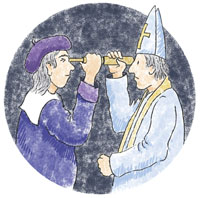Instead of shooting rhetorical spitballs in the other's general direction, boosters of both science and religion should start sharing a desk.
In the hundreds-of-years war between science and religion, the original shot heard 'round the Old World was the 1633 trial of Galileo Galilei before the Roman Inquisition. That trial reverberated most recently in a skirmish that eventually led Pope Benedict XVI to cancel a speech at Rome's largest university after several dozen physics professors and students protested the pope's appearance because, they alleged, he defended Galileo's treatment by the church in a speech in 1990.
Of course to deny a churchman the right to speak as retribution for the church's identical treatment of a scientist in the past is absurd to say the least. As Italian Nobel Prize laureate (and prominent church critic) Dariel Fo told Italy's La Repubblica, "I'm against any form of censorship because the right to [free] speech is sacred."
But the pope also erred by acquiescing to the protesters' demand. Sure, he faced the prospect of being heckled, as Pope John Paul II was in 1991, but by declining to attend and sending only his speech, he effectively ceded the field to science at its most irrational. A counterprotest that rallied tens of thousands of people to the pope's side was no less a blunder as it only upped the ante in a battle that shouldn't even be going on. It is also one that religion is bound to lose in a society that so highly prizes scientific knowledge.
Catholic teaching since the 1950s (OK, relatively recently) has generally supported modern scientific progress. Pope Pius XII's Humani Generis affirmed that evolution and Catholic faith were more or less compatible. Pope John XXIII, while horrified by the scientific catastrophe of nuclear weapons, expressed great confidence in modern technology to solve the world's many problems. Pope John Paul II also supported independent scientific inquiry, notably in a speech in 1996, in which he argued that "theologians…need to be well-informed regarding the results of the latest scientific research."
Indeed, science, for all its failures (see nuclear weapons), can offer much in support of a Catholic vision of the universe. We can thank medical science for giving us insight into the earliest stages of human development, knowledge that many in the prolife movement have used to encourage respect for life in all its stages. The Human Genome Project, headed by Francis Collins, an evangelical Christian who speaks openly about the connection between his research and his faith, is literally uncovering strand by strand the four-letter alphabet of life. Advances in ecological and biological science have increasingly highlighted our interdependence with creation-and the disastrous consequences that await all life if we human beings continue to destroy our earthly habitat.
Even the much-assailed theory of evolution has generated breakthroughs in our understanding of God's ongoing creative action in the world. In the words of Father George Coyne, S.J., former head of the Vatican Observatory, in a January 2006 talk: "For the religious believer modern science reveals a God who made a universe that has within it a certain dynamism and thus participates in the very creativity of God…. God lets the world be what it will be in its continuous evolution. He does not intervene, but rather allows, participates, loves."
Pope Benedict has recently written, and rightly, that "no science can say who man is, where he came from, or where he is going." His critique of "scientific developments [that] attract and seduce because of the possibilities they offer" are warranted because, as we well know, the wonders of science without the guiding hand of ethics can and have generated great horrors, from the racial theories of the past century to designer superhumans that lie just beyond our scientific horizon to ever more devastating weapons that even now threaten our very existence.
But neither science nor religion, nor the truth that each bears, is well served by our separation into warring camps. If truth is one-as Christian thinkers have insisted since the beginning-then the claims of science and religion do not compete but complement and mutually enrich each other. Instead of knocking heads, then, proponents of both should start putting their heads together.














Add comment